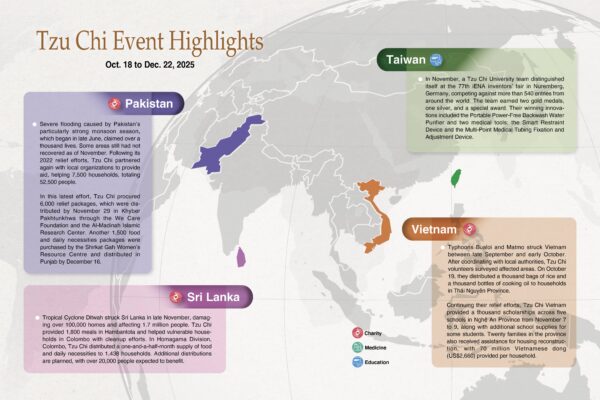By Li Shu-yun and Yang Shun-bin
Translated by Wu Hsiao-ting
Tzu Chi volunteers derived immense pleasure by preparing boxed meals for hospital workers during the coronavirus outbreak. They put their heart and soul into cooking these meals. They hoped that they could spark joy in the hearts of the frontline medical workers the moment they opened their meal boxes.
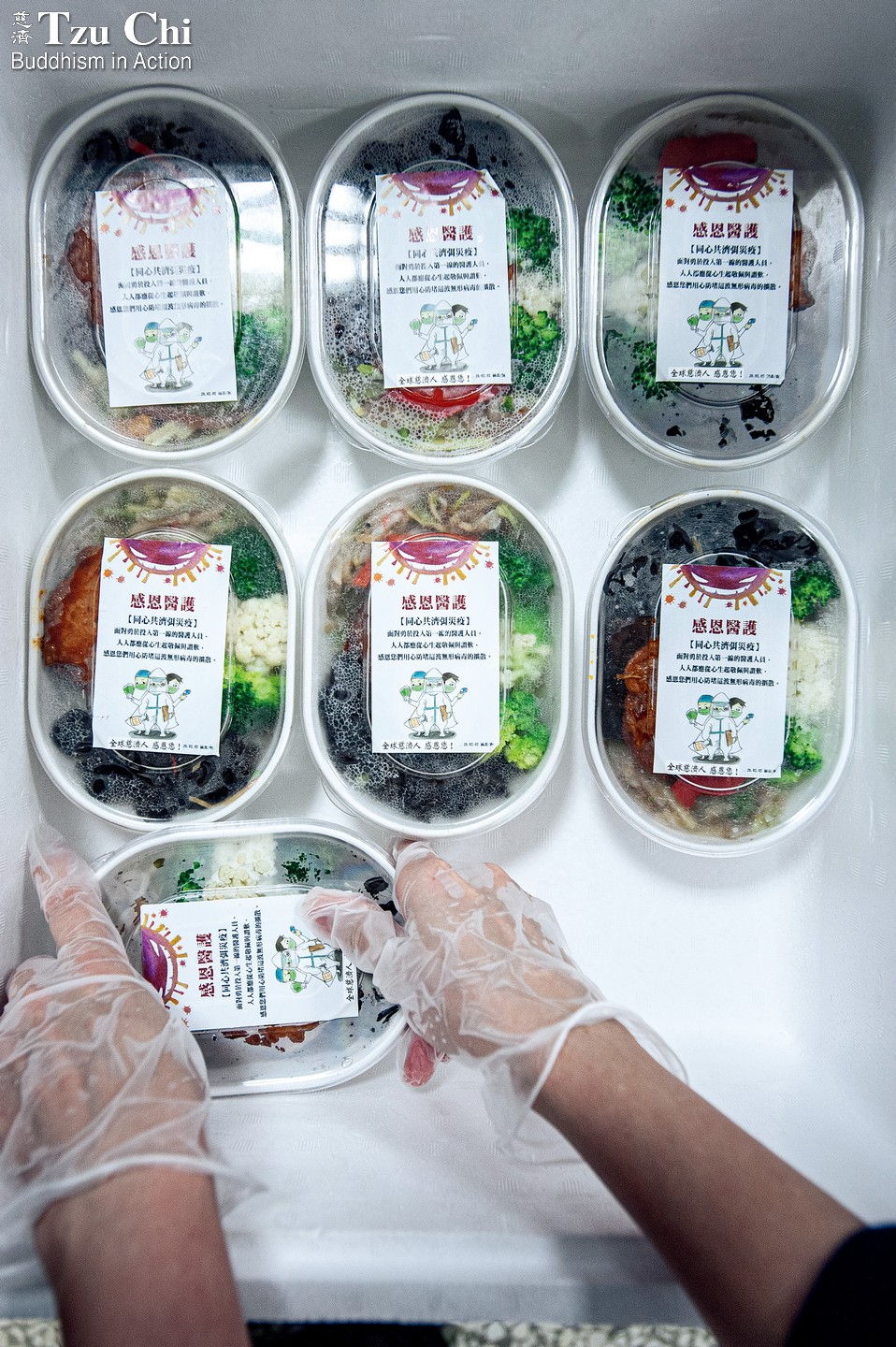
A volunteer places boxed meals into a Styrofoam box to keep them warm for delivery to medical workers. Tzu Chi volunteers prepared lunches for medical workers during the COVID-19 pandemic to offer them support and cheer them on. HUANG XIAO-ZHE
More than 400 coronavirus cases had been diagnosed in Taiwan by late April 2020. Many more people, over 100,000, have been or are currently under home quarantine. Though Taiwan has fared better than most other countries in the containment of COVID-19, the disease still looms large for people on the island. The virus is like an invisible enemy, creating not just physical and social distance between people, but also emotional distance. The disease has brought suspicion and wariness and driven wedges between people. This tense atmosphere was exemplified in early March when some eating establishments refused to deliver orders to hospitals for fear of infection. Though anxiety about the coronavirus was understandable, such actions were a blow to the morale of the medical professionals who had been working hard to save lives ever since the disease broke out.
How it started
The kitchen at the Tzu Chi Neihu Campus, Taipei, was busier than usual on the morning of March 26. Volunteers began arriving around six, one after another, until there were nearly 50 of them busy at one job or another. Xu Li-xun (許麗薰) signed in her fellow volunteers as they arrived and sanitized their hands. They dove into work, some picking through and washing vegetables, some chopping ingredients, and some disinfecting lunch boxes with scalding hot water. They worked efficiently together like a well-trained and coordinated army.
When Chen Mei-yue (陳美月), a senior volunteer who lives in the Neihu District of Taipei City, saw news of restaurants refusing to accept delivery orders from hospitals, she thought, “It’d be great if we could provide [the medical workers] with boxed meals to warm their stomachs and hearts.” Tri-Service General Hospital, located near the Tzu Chi Neihu Campus, came naturally to her mind. The hospital was a major medical facility. During a time like the coronavirus outbreak, she knew medical professionals there must be working extra hard to safeguard people’s lives.
Chen knew that some of her fellow volunteers in the Datong District had initiated a meal delivery program for the medical staff at the Zhongxing branch of Taipei City Hospital earlier during the outbreak. Inspired by their action, she decided to contact Tri-Service General Hospital and ask if they’d like Tzu Chi to prepare vegetarian lunches for them. Much to her pleasant surprise, the response was very enthusiastic. A daily average of more than 600 people signed up for the week-long meal service. That number covered nearly one-third of all workers at the Tri-Service hospital during the day.
“We’re cooking for 800 people today,” said Wu Sun (吳), who has served as a culinary volunteer for more than ten years. “For that number, we’ll need to stir-fry two large woks of edamame beans.” She poured some pre-boiled beans into a wok, dexterously added in pepper, sesame oil, and other seasoning, then stir-fried the ingredients over high heat. The aroma of the dish instantly permeated the air.
Working alongside Wu was Yu Zhen-hao (余真好), also a veteran culinary volunteer. Wu and Yu have worked together for a long time and have developed remarkable chemistry. Working with Chen Mei-yue, they created the menus for the Tri-Service General Hospital meal service. The trio made sure each meal was nutritionally balanced, appetizing, and attractive, and that no dish was repeated during the course of the week.
Wu explained that every meal contained two main dishes. On this day, there were Smoked Gluten Rolls and Three-Cup Mushrooms. These main dishes were accompanied by edamame beans, bok choy, and pickled leaf mustard. The mushrooms contained polysaccharides, and the edamame beans were rich in protein. In addition to being nutritious, the food was appetizing and displayed an enticing combination of colors.
To ensure that the boxed meals would arrive at the hospital by 11 a.m., more than 20 volunteers started a little after 9 a.m. portioning out food into lunch boxes. After they had prepared 650 boxes of food, they packed the meals into 22 containers and loaded them onto a sterilized truck to be delivered to Tri-Service General Hospital. Deputy Superintendent Cheng Shu-meng (鄭書孟) was there to greet the volunteers when they arrived with the food. The hospital is a military hospital, so Political Warfare Director He Zhong-nan (何中南) was also on hand to greet the volunteers.
The deputy superintendent and director said that due to COVID-19, their hospital had instituted measures to avoid crowd-gathering during lunch hours, which made having lunch more of an inconvenience for hospital employees. The meals provided by Tzu Chi thus saved some trouble for the employees, especially for those working in the isolation ward. They thanked Tzu Chi profusely for their service.
The meals were delivered to the hospital by 11 a.m., and at two p.m. volunteers visited the hospital again to collect empty meal boxes. As the volunteers were getting ready to leave, a hospital worker, Ms. Li, came out to thank them. She said that she had once enjoyed a Tzu Chi boxed meal while attending a meeting at Hualien Tzu Chi Hospital, and she had been impressed by how delicious it was. She said that the boxed meals this time were just as tasty as the one she had eaten at Hualien Tzu Chi Hospital. Many of her colleagues were just as impressed. “It was just like a home-cooked meal, except that there was no meat in it,” some remarked. Obviously, the food had gone down well even with non-vegetarians.
Nearly 50 Tzu Chi volunteers were mobilized every day for the one-week meal service for healthcare professionals at Tri-Service General Hospital in the Neihu District, Taipei. Volunteers took care of everything from preparing ingredients and cooking them, to packing up and delivering the meals, to cleaning up. HSIAO YIU-HWA
A lot of care
The empty lunch boxes were properly washed at the hospital, but to guarantee the safety of volunteers and those who would use the boxes next, the containers were given another thorough wash when they were delivered back to the Neihu campus. A dozen volunteers put on raincoats, face masks, and gloves before breaking into three groups for the task. They first disinfected the boxes with alcohol, then washed them with detergent and water. The boxes were heat-dried in the final step. A lot of care was used in the process.
It took the volunteers nearly three hours to process the 600-plus meal boxes. It wasn’t an easy job. They were on their feet when they first started, but they eventually had to sit down to relieve their aching lower backs. And because everyone was wearing a raincoat, they became very sweaty too. Despite the physical challenges, no one complained. Instead, they were happy for the chance to give.
Volunteers contributed more than their time, energy, and strength for this meal service. They contributed their money too, as they divided the cost for all the vegetables and other ingredients among themselves.
Chen Mei-yue said that many Tzu Chi events had been cancelled on account of the coronavirus, and the Neihu campus was thus a lot quieter than normal. She was glad that the meal program had brought some liveliness back to the campus and had offered volunteers a chance to give during the outbreak. She hoped to spread love to more hospitals via more meal programs during this difficult time.
Tzu Chi hot meal service
In the 54 years since Tzu Chi was established, Taiwan has experienced countless natural disasters. After every disaster, Tzu Chi volunteers are on-site to provide support to first responders and survivors. Sometimes the love of the volunteers is manifested in one serving of hot food after another, which warm not just people’s stomachs but also their hearts.
For the purpose of providing meals in the immediate aftermath of a disaster, almost all Tzu Chi Jing Si Halls around Taiwan are equipped with cooking facilities. The Tzu Chi Neihu Campus was the first Tzu Chi facility in northern Taiwan to boast a central kitchen. The kitchen has played a vital role in the foundation’s disaster relief work in Taiwan, including the September 21 Earthquake in 1999, Typhoon Xangsane in 2000, Typhoon Nari in 2001, the SARS epidemic in 2003, and even the TransAsia Airways Flight GE235 crash five years ago.
Chen Mei-yue recalled that 21 years ago, after the September 21 Earthquake, she and her husband, Qin Ji-xiong (秦基雄), rushed to a collapsed 12-story building in Songshan, Taipei, to determine what assistance Tzu Chi could render. As soon as they arrived, they saw rescue workers there having breakfast. The couple asked the first responders if they had their lunches lined up, and they said no. After inquiry, Chen found that they would need to fix about a thousand boxed meals for the people on-site. She quickly contacted other volunteers to help purchase ingredients and prepare the lunches. By noon, a thousand meals had been delivered to the disaster site.
Master Cheng Yen was impressed when she learned what Chen and the other volunteers had accomplished. “You managed to prepare so much food with such a small kitchen!” she exclaimed. The cooking facilities they had back then weren’t as good as they are now, but that wasn’t a problem for the volunteers. “Nothing is difficult if you have the will to do it” has always been their motto.
The volunteers have better facilities today, so cooking for large numbers of people is even less of a challenge for them. Though the pandemic required them to take extra precautions when preparing the meals, they didn’t hesitate to step forward—they had confidence they would be able to pull it off.
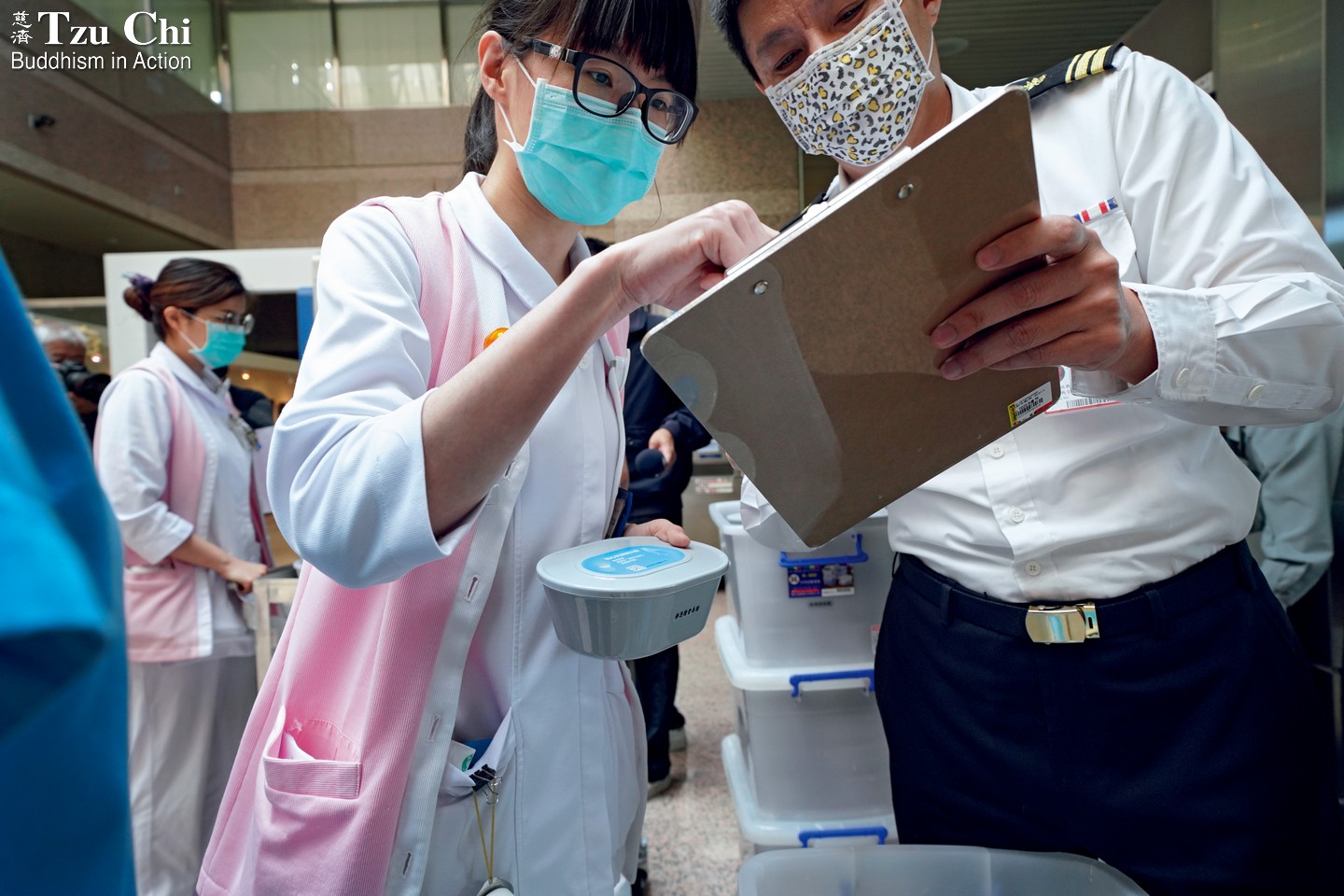
Tzu Chi meals delivered to Tri-Service General Hospital are distributed to hospital workers. HSIAO YIU-HWA
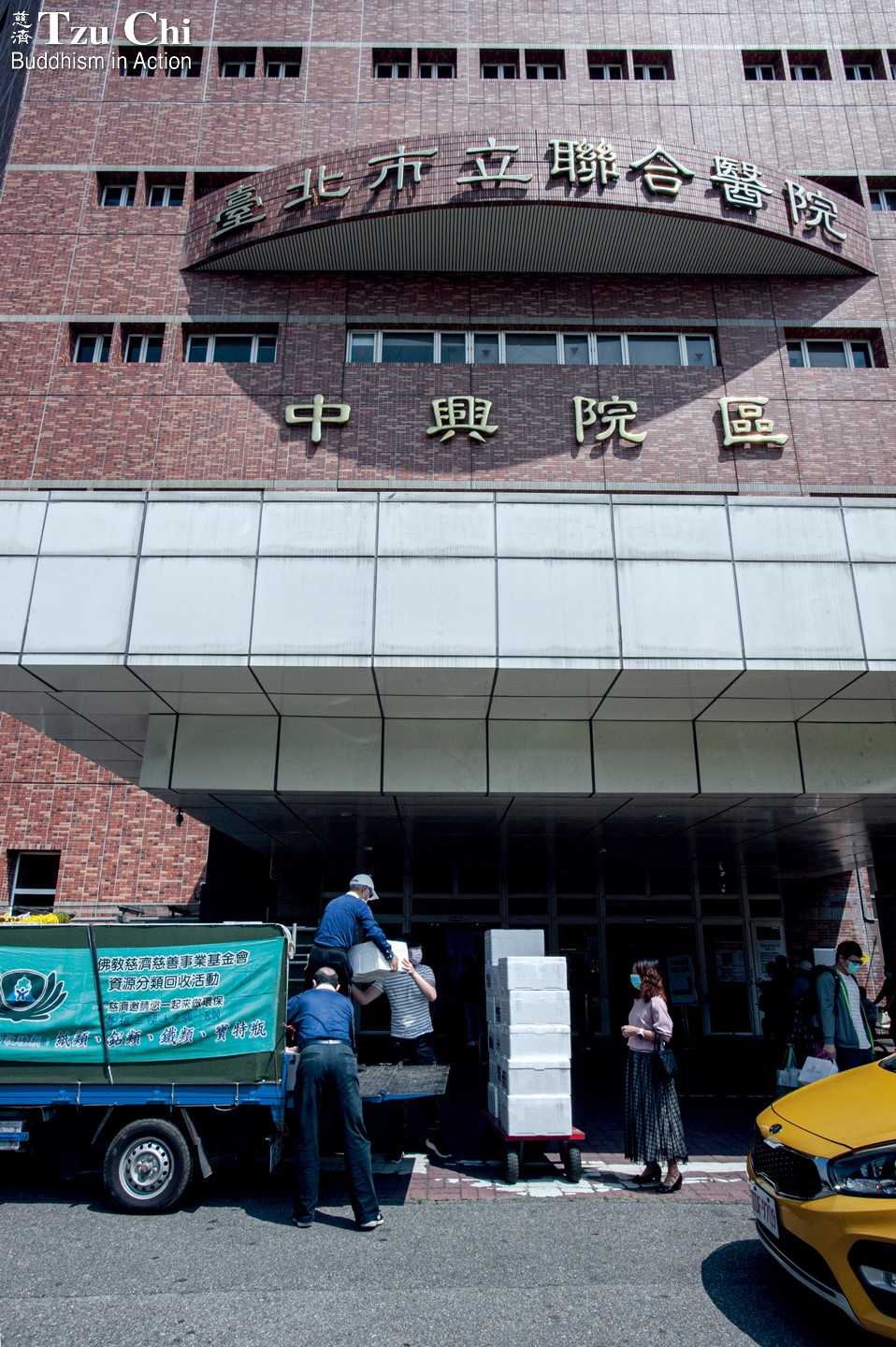
Volunteers deliver boxed meals to the Zhongxing branch of Taipei City Hospital. HUANG XIAO-ZHE
Thank-you notes
Volunteers in the Taipei districts of Datong, Zhongshan, and Bade were the first volunteers in northern Taiwan to initiate a meal delivery service for hospital workers during COVID-19. On weekdays from March 16 to 31, volunteers in the three districts took turns providing lunches to workers at the Zhongxing branch of Taipei City Hospital.
March 26 was the last day volunteers in the Datong District were responsible for organizing the meal service. Everyone went all out. More than 1,300 people had signed up for lunches on this day. Aside from more than 400 hospital workers, lunch recipients included police officers, fire fighters, government workers, school staffers and students, and community residents in the local area. In fact, Tzu Chi provided vegetarian food to anyone who signed up for the program to promote vegetarianism during the pandemic. The foundation has for a long time now urged people to eat vegetarian in order to nurture compassion, protect the Earth, and help dispel disasters. A crisis like the pandemic has especially called for people to amass blessings by eating vegetarian and preventing animals from being killed.
On the morning of March 26, the kitchen area in the Jing Si Hall in the Datong District was all astir. The kitchen itself was small and only a few people could work in there at the same time, so most volunteers had to work outside. Right outside the kitchen a group of volunteers were preparing food ingredients. Off to another side, more volunteers were washing vegetables at a row of kitchen sinks.
Volunteer Zhang Gui-yan (張貴燕), who oversaw cooking here, explained that the most important thing in planning a menu was to avoid the repetition of dishes. Another guideline was using in-season vegetables or vegetables rich in protein. Ingredients needed to be varied in color too so that the completed dishes would look appealing.
Zhang said that though the bottom of her feet hurt from standing too long every day during the meal service program, she wasn’t bothered at all. She and the other volunteers involved in the program had received a lot of warm, uplifting feedback from program participants, and that was enough to make her forget her fatigue. She was also happy to see volunteers developing closer bonds by participating in the meal service.
Wang Yi-zhen (王憶偵) started volunteering for the service on March 24. She said that every time the empty meal boxes were delivered back to them, they had to sterilize them with alcohol before giving them a good wash and then disinfecting them with steam. The sun would be high in the sky when they started working, but would have sunk below the horizon by the time they finished. After washing for five hours straight—there were about 1,300 meal boxes to wash each time—everyone’s back hurt and their faces were covered in sweat. “We’ve washed a year’s worth of lunch boxes,” some would say, exhausted.
However, washing the containers wasn’t all drudgery. Wang took out a thank-you note she had discovered in an empty meal box. The piece of paper read, “This was a precious boxed meal, more delicious than what’s offered at the most sumptuous banquet.” Besides notes like this discovered in returned meal boxes, lunch recipients sent their thanks via a group chat too. Wang said that these encouraging words were very important to her and her fellow volunteers. They made her forget her tiredness, filled her with renewed energy, and made her more eager to serve the next day.
“Our hospital has more than a thousand employees,” said Chen Jing-lin (陳靜琳), director of the administrative center at the Zhongxing branch of Taipei City Hospital. “We were really surprised when we learned that Tzu Chi imposed no limit on the number of meals we could order. They said they would give us as many as we wanted.” According to the director, some employees at first hesitated to sign up because they felt they had done nothing to deserve such kindness, but they changed their minds after hearing about Tzu Chi’s effort to promote vegetarianism. Some signed up later during the program when they heard their colleagues praise how delicious the food was.
Chen also shared that when the September 21 Earthquake hit in 1999, many medical workers from her hospital went to the disaster areas in central Taiwan to help. An orthopedist on that mission told her that except for their first meals, all their other meals during their stay in the disaster areas were provided by Tzu Chi. “I might have dropped dead of hunger midway through our mission if not for Tzu Chi,” the orthopedist even said, half jokingly.
Salute frontline healthcare workers
“Every Tzu Chi volunteer carries a sense of social responsibility,” said volunteer Chen Shun-chi (陳順池) of the Datong District. He observed that everyone, like him, was grateful for the chance to serve and cheer on frontline healthcare professionals during the pandemic. It was just like during the SARS epidemic. Instead of holding back, volunteers seized every chance to give.
Since the outbreak started, the Tzu Chi headquarters in Taiwan has endeavored to provide the best support for the Taiwanese government. In addition to meal services for hospitals and other institutions, the foundation has provided more than 40,000 gift packs for people under home quarantine. Tzu Chi has also donated medical masks, rubber gloves, safety goggles, protective gowns, alcohol for disinfection, and other anti-coronavirus supplies to first responders, the National Immigration Agency, and detention centers for illegal immigrants.
Faced with a virus for which no cure has been discovered yet, Master Cheng Yen says that the best way to respond is to eat vegetarian to protect life, pray piously for the welfare of the world, do things that benefit all living creatures, respect one another, and love life. She hopes more people can join to do good and allow more kindness and love to converge to help carry people through the pandemic in peace. (Part of the information of the article was provided by Lu Qiao-mei.)
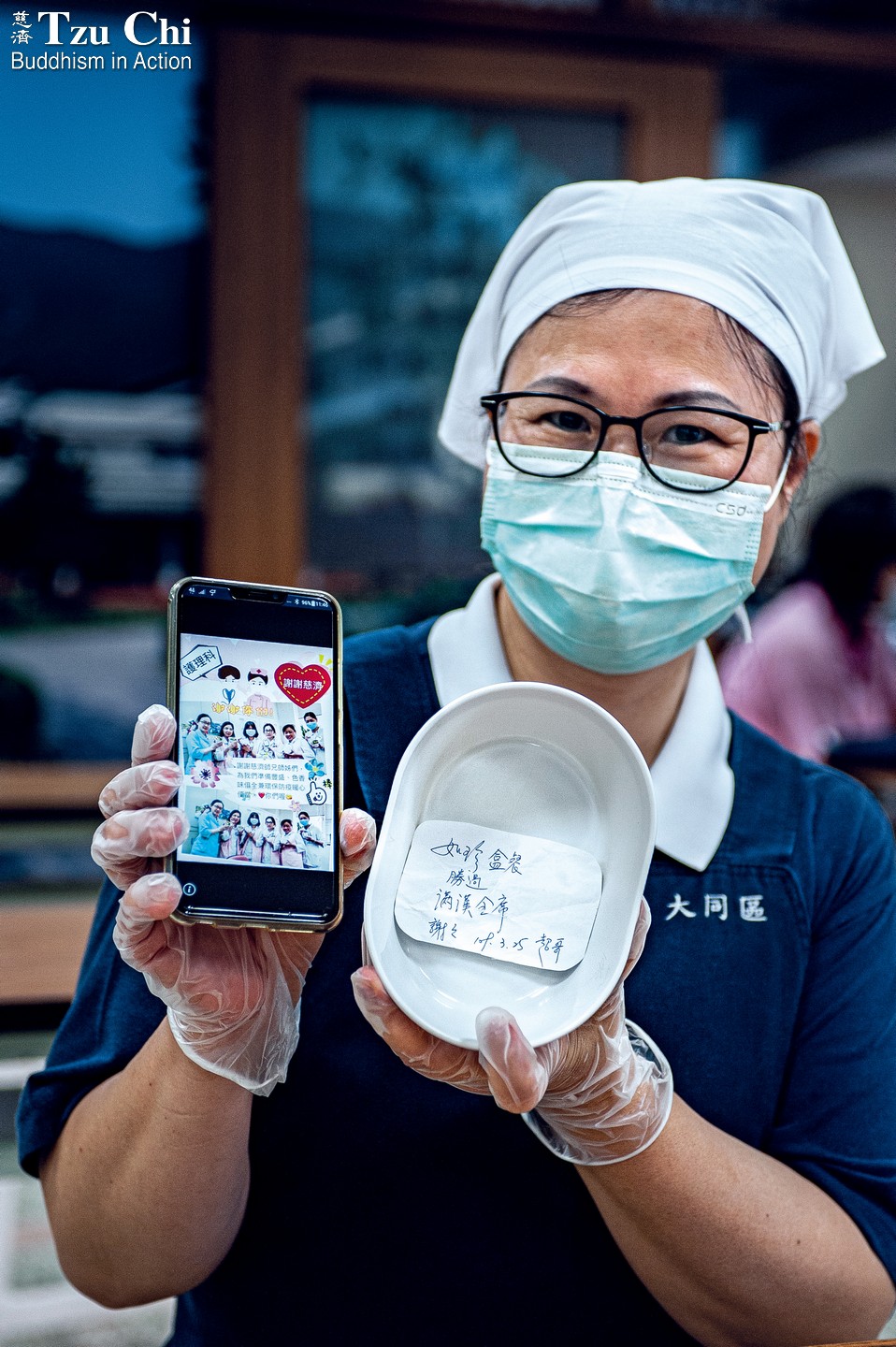
Volunteer Wang Yi-zhen says that though it was hard work washing over a thousand lunch boxes every day with other volunteers, the heart-warming feedback from hospital workers made her forget her fatigue. The note from a recipient in the meal box reads: “This was a precious boxed meal, more delicious than what’s offered at the most sumptuous banquet.” HUANG XIAO-ZHE


